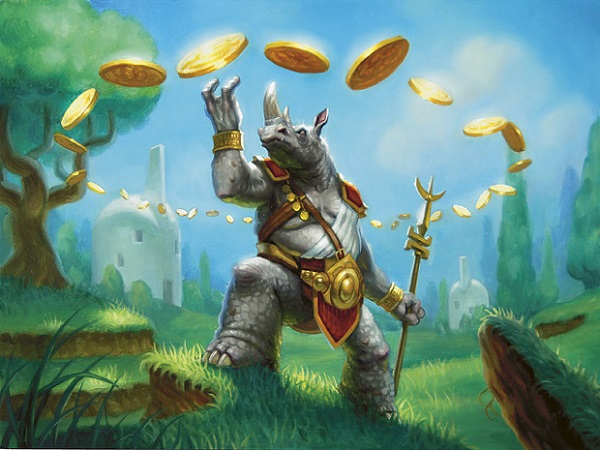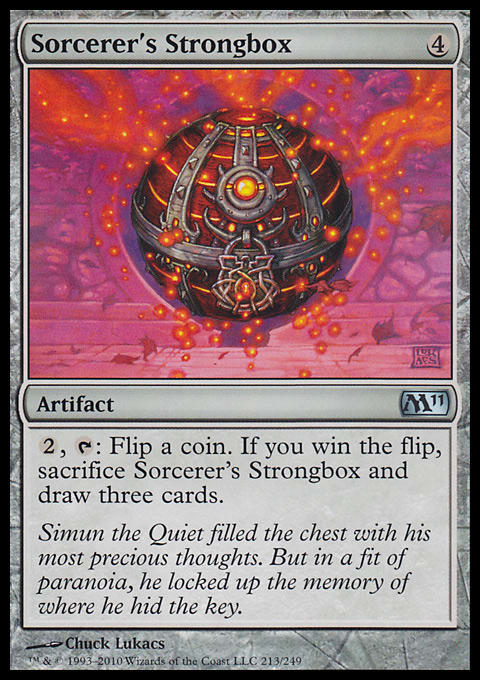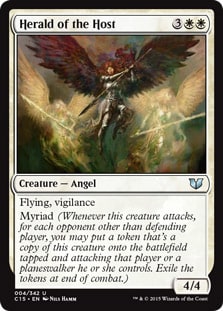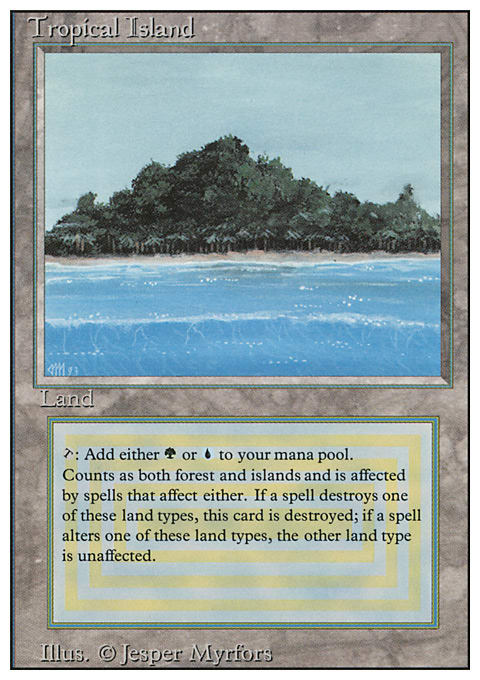It was on Gathering Magic (then called Mana Nation) back in April of 2010 that I started writing for an “official” Magic website, so it’s an honor to be back for a visit. I recently began a project to design a “Commander Battle Box” and I get to chronicle that journey for you in this short series. I assume that the words “Commander Battle Box” might set your mind a buzz with questions, but one thing you’ll learn about me is that I like to tell stories — so sit back, relax, and we’ll take the long way around.
I've been out of the game of Magic for the last three years. From time to time, I’d casually peek into the multiverse. Every six months or so I’d do a draft, or battle some Commander with friends. As time passed the rhythm of my life changed. New currents like the excitement about my new-found faith, rediscovering my wife, and the birth of my beautiful daughter, reshaped the flow of my life. Magic faded into the background and eventually became just another package next to the Pokémon cards at Wal-Mart. I’d lost track of what sets were coming out and when. I didn't know (or care) which cards were spiking in price, or what the latest twitter drama was. That’s where I was at about three weeks ago when I found myself at my friend Jake's house.
Visiting an Old Friend
"How much time do you have?" he asked. "I've gotta be heading home by sixish. Why?" Jake pulled a white thousand-count box off the shelf, "I didn't know if you wanted to try Battle Box . . . " he responded. “Sure!" I hadn’t played Magic in a while (this my excuse for losing horribly), why not give it a spin. Fifty five minutes later, I was staring down a Rhox War Monk who was getting ready to lay some more rhino beats on my life total. I checked the time on my phone, it was definitely time to go. I was losing anyway, since Jake had completely out-tempoed (out-played) me. I scooped up the cards and thanked Jake for the games. Then I hurried to my car and headed home.

It was a short play session but I was sold on the idea of Battle Box. I'll admit that some of my excitement was due to appearance of Rhox War Monk (my card crush from 2008). When I got home, I texted Jake and asked him for a link to the article that had his Battle Box list. As I scrolled through the list, I realized that I had a bunch of these cards in a box of bulk which I was planning on selling later that week. I spend an afternoon picking through the box before listing it on Craigslist. With my pile of freshly picked bulk, I decided to design my own Battle Box. I’d use the list from the article for inspiration, but raise the power level a bit. I’ve been studying game design lately, and this would be a good opportunity to design a Limited environment. I’ve also been interested in a way to play Magic with low time, and low money commitment. Of course, this catapulted me into hours of “catch up”, design theory-crafting, and eventually (not one, but) two Battle Box build projects. The irony is not lost on me.
What is Battle Box?
Ok, let’s take a break from the story to do some housekeeping. You might be asking the question, “What is Battle Box?” (sorry to leave you hanging). There are two great articles that offer in-depth reading on what the format is, and why it was created. The first is by the creator of the format Brian Demars, “The Danger Room”. The second is by Magic Hall of Famer and Battle Box evangelist Ben Stark (this is the list Jake uses by-the-way) “Stark Reality — Battle Box”. For the purpose of this article, I’ll summarize the format in the paragraph below.
Battle Box is a casual format which removes elements of variance (namely “mana screw” or “manaflood”) from Magic to highlight skill-intensive play. In this format both players receive “perfect mana”, five allied-colored guild gates, and one of each basic land in separate land pile. These can be played as if they were in your hand. Both players play from a shared pool of cards — the Battle Box. Your starting hand size varies based on what Battle Box you're playing, but it’s typically between four and six. There are no mulligans. This is essentially the core of the format. There are other features and nuances, but I’ve intentionally kept the details sparse since we’re going to dive much deeper when we commandeer the format, and repurpose it for commander. At the end of this article I’ll talk about the commander specific “rules” for Battle Box, so that should give you a full picture.
Meanwhile Back at the Build
It didn’t take more than a week to assemble the skeleton of my one-on-one (1v1) Battle Box. My generous friends were happy to donate cards from their own collections to help me fill out the holes in my box (Thank you Jake, Nick, and Taylor). Once I had a playable box, I took it to work and invited two of my friends to battle at lunch. Since there was three of us (an odd number) we decided to play multiplayer. As we were battling, I started thinking about tweaking the design for multiplayer. My first instinct was to “hide” the multiplayer design inside the 1v1 design. This would give me the ability to play in different situations, and not incur the cost of building a multiplayer Battle Box. I remembered an angel card that caught my eye when I was designing my initial list, it perfectly hides the multiplayer design without impacting the 1v1 design; Herald of the Host.
Not only do I love the elegance and scalability of the Myriad mechanic, but Herald of the Host also fits the power level of my box. One of the Battle Box design tenants is to build with a flat power level. This is to help reward strong technical play, rather than let the swings of the game be determined by bombs. To help get the power level right, Battle Box designers tune their power level to a creature. To illustrate with an example, you won’t see Serra Angel and Baneslayer Angel in the same box, but you’re likely to see, Serra Angel and Serra Sphinx in the same box. I use Serra Angel as an example, because many Battle Boxes use her to tune their power level, which is why Herald of the Host fits this spot so well.
Despite the fact that Herald of the Hosts helps to accomplish my “hide” plan, there are other problems that are not easily solved. There’s a tension between the two different styles of play (1v1 and multiplayer), and it’s hard to resolve these tensions well. For example, spot removal is very important in 1v1, but less important in multiplayer. In multiplayer, you want a good count of board wipes to keep the board in check, but in 1v1 a board wipe prolongs the game, and deemphasize combat. Another issue that presented itself is that the power level of most of the creatures in my Battle Box is sub optimal for multiplayer games. Don’t get me wrong, Rhox War Monk is a beast (actually a Rhino Monk), but he’s not going to get the job done in a five player game, neither is Ravenous Rat.
As you know from above, I ended up abandoning the “hide” plan, and started work on designing a multiplayer box. In my research, I stumbled onto http://www.mtgbattlebox.com, a site devoted to Battle Box content. They outline a Commander Battle Box project, which inspired me to use the Commander format for my multiplayer box design. Commander has long been my favorite Magic format — with the exception of Standard, when U/W Flash was a deck — I will forever love Adam Prosak for creating that deck. Now that I had some inspiration and direction, it was time to phone a friend.
I Got Ranted
I texted my old podcasting buddy Jay Boosh to sniff out some possible collaboration. Over the years Jay has put a lot of work into his Commander Cube, even designing card specifically for the Cube. We don't usually text about Magic so I'm sure it was strange to get a text from me on the topic.
"Have you ever heard of the Battle Box format?”
My question lead to one of Jay’s infamous rants, about how Magic players love making fake formats that don't serve any purpose. The great thing about Jay’s rants, is that they are not nonsensical. They always have some underlying truth or question. Underneath this rant, was the question:
"How is Battle Box better that Cube?"
I should’ve saw this coming, since Jay's pet project is a Commander Cube! But it's a fair question, and one I should consider if I'm going to invest time and money in building this. I think as gamers it's natural to try to evaluate for the "strictly better" option, but in my opinion there is no “strictly better” choice. It's like asking “How are oranges better than apples?”The answer is, one is not better than the other, they're just different. If you're making orange juice, then you're going to want oranges, but if you're making an apple pie then you want apples. Cube is great, and so is Battle Box. Instead of calling one "strictly better", I'll tell you why I'm making orange juice (building a Battle Box) instead of an apple pie. Below are five reasons why I gravitate toward building in this format. Some of these reasons are based on my lifestyle and others are on the design.
- It's cheaper to build — This point is debatable because there are many ways to build a both a Cube and a Battle Box. But if you compare two designs with similar experiences, Battle Box will naturally be cheaper because you don't have to invest as heavily in the mana base. For a Cube, you typical want to include Shock Lands and even Revised Dual Lands. In Battle Box your mana base is made up of primarily Guild Gates and maybe a few Mana Confluence, we'll get to that later.
- It faster to setup — My lifestyle doesn't afford me much extra time. If I have time for Magic, it might be a couple of hours on the weekend. I want to maximize that time. As much as I enjoy drafting a Cube, if given a choice I'd rather spend the time playing actual games of Magic. You can be playing a game of Magic in under two minutes with Battle Box.
- It's easier to arrange — Firing a draft is hard. Last time I had a Modern Masters draft at my house we had someone drop at the last minute (Don’t worry bro, I'm not bitter). You run into the same problems with Cube draft, unless you have a playgroup that does it as part of their routine. With Battle Box you don’t need to set up a draft. All you need is three to six people who know how to play Magic, and enjoy Commander.
- “Perfect mana” — It's not that I have a vendetta against the mana system. Mark Rosewater actually does a great podcast on why the variance of Magic's mana system is important to the health of the game. I can get behind Maro’s rationale, but we’ve all sat at game of Commander where that one person is stuck on two lands for 10 turns. Then someone Acidic Slimes their land for the “lols”(that someone may or may not have been me). It feels bad, and nobody wants that. Reduction of the “feel bads” is one reason that I like “perfect mana”, but there’s another reason. Not having lands in the deck changes the game in a way that is not immediately apparent, and it has far reaching implications. For example, Card draw effects are much more impactful than they were designed to be, since every card you draw is “action”. You never have to wonder if you’re opponent “has anything”, since their whole hand is “gas”. Not to mention that Scry effects become more interesting and tactical with a shared library.
- Design Challenges — I would consider “perfect mana” a design benefit, but making a Battle Box list comes with challenges. For example, building synergies into the design is tough because it’s hard to ensure that a player will have access to necessary cards in a given game. Another challenge is developing a curve in the Battle Box. Since players can play a land every turn a strong curve is important, but early plays (one to 3 mana) that have a low impact in the late game, will put a player at a disadvantage if they draw them. It’s thinking through these challenges that makes designing a Battle Box list fun.
What Is Commander Battle Box?
All right, before I leave I wanted to talk about the Commander Battle Box rules that I’ll be using for my list. Keep in mind that you can play the format however you like, these are not official — It’s just a melding of the different sources that I’ve come across and the foundation for my list (which I will share in the next installment).
- Each player starts the game with a land pack. The land pack contains one of each allied-colored Guild Gate, one of each basic land, and 1 Mana Confluence. The normal rules of Magic for playing lands apply.
- Each player starts the game with 4 cards. There are no mulligans (this is mainly because five people shuffling a 375 card deck takes forever).
- After each player has reviewed their starting hand, they must select a Commander from the Commander Pool. The person who plays last will get first choice, then work your way up to player one.
- After the Commanders are chosen, each player choses a utility land from the utility land pool. Use the same order that the Commanders were chosen.
- You will play from a shared library. The shared library is considered “your library” and “your opponent’s library”. This means that effects that rearrange the top of your library will affect your opponent’s draw. This also means that casting Memory Lapse to place your opponent’s Terastodon on the top of “their library” then drawing a card (or manifesting it) will make you smile.
- You will play with a shared graveyard. The shared graveyard is considered “your graveyard” and “your opponent’s graveyard”. This means that you can Putrefy your opponent’s Consecrated Sphinx, then play your Karmic Guide to make the whole table hate you.
- Because lands are capped at eleven, you commander can never cost more than eleven to cast. If your commander would cost more than eleven, it costs eleven instead. This includes commander tax.
- All other Commander rules apply.
I hope you’ve enjoyed this article. I’ll be back in two weeks to share my list with you and talk through the design and card choices. Until then, I want to hear your thoughts in the comments. I’ll leave you with these shout-outs.
Shout-Outs!
I want to end each article by shouting out different people or things from the community that I think are great. You might have noticed that I squeeze a lot of shout-outs into the article but these didn’t fit so I made some space here.
Evan Erwin and Robert Burrows — I wanted to thank these two guys for hooking me up with this sweet writing gig. And an extra “thank you” to Evan for always tapping the cards so I don’t have to.
EDH — Throughout this whole article I’ve called it “Commander”, but it will always be called EDH in my heart. I’m going to stuff as many dragons into this list as possible!
Mike Flores — I was really happy to see Mike’s article last week. Shout-out to Mike for gracing the front page of GatheringMagic.com with his brilliance. <3
Derfington (Dave Lee) — I really enjoyed listening to Derf's adventures on his old podcast. He was gracious enough to do the art for the feature image of this series. If you have a moment, check out his Magic web comic "Durdling Around".
Thanks for reading!
Jonathan Medina



























